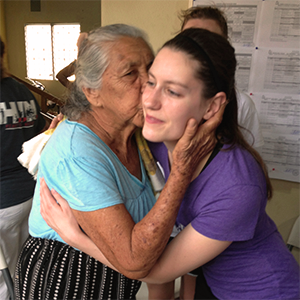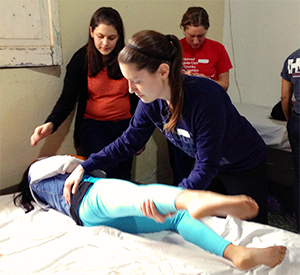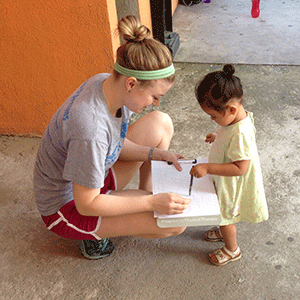
For a week during winter break, 19 students and two alumnae from the Program in Physical Therapy at Washington University School of Medicine traveled throughout Guatemala to help patients who otherwise might not receive physical therapy and other health care due to financial or geographical challenges.
The group came to Guatemala through Hearts in Motion, a nonprofit organization that provides humanitarian services for children, families and communities throughout Central and South America.
Washington University third-year physical therapy students have been coordinating mission trips to Guatemala with Hearts in Motion for about five years, student Leslie Wallace said.
“It was a wonderful opportunity to use our skills and knowledge to help people who wouldn’t have the opportunity otherwise,” said Wallace.
Most of the students in this year’s group had gone on mission trips before with nonprofits like Habitat for Humanity, but this was the first time many were able to use their physical therapy education as a key component of the service work.
During the week, the group visited five different sites throughout the eastern half of the country, where they treated patients young and old. Their conditions varied from orthopedic problems like shoulder pain to neurologic issues such as Parkinson’s disease.

(Credit: Allie Harris)
Orthopedic conditions often result from overuse, as was the case for many of the physical therapy students’ Guatemalan patients, who have labor-intensive jobs in construction or farming that require heavy lifting and repetitive motions that can lead to pain.
“We would give exercises to improve weakness or posture, help modify daily activities to minimize injury and provide education so they could manage or minimize pain and still do their necessary day-to-day activities,” said student Ellie Maglia.
Physical therapy typically can require weeks or months of office visits in the United States, but during the trip to Guatemala, the group only had one day at each site to work with each patient. Given those limitations, the group’s goal was to help patients decrease pain while increasing function and quality of life by offering advice on stretching, exercise and proper movement.
By showing people with neuromuscular conditions how to use canes or walkers to stabilize their balance, the students were able to help some people regain more independence. For those whose conditions were more severe, the students educated their caregivers on how to safely move loved ones to avoid injury.
Those who received the students’ help seemed eager to absorb the information and confirm their mastery of the recommended exercises, said student Allie Harris. They were appreciative of the care and made sure the students knew it.
“They were the most grateful people we had ever met,” said Wallace. “Just showing people how to use a cane would make them so happy. They were hugging and kissing us before we even treated them.”

On the first day, local residents formed a line outside the makeshift clinic two hours before it was scheduled to open. They had heard about it from neighbors who had been helped before.
“Throughout the day people would tell their friends and family, who would then show up later that day,” student Stacie Schaidle said. “I couldn’t believe how many people were there from word of mouth.”
In addition to hands-on work with patients, the students also brought donations that included orthotics, splints, crutches, canes, walkers, braces, shoes, exercise-therapy supplies and personal items.
“It was amazing to see so many people sharing their time, distributing donations that were much appreciated and having a blast while doing it,” Maglia said.
“Our trip to Guatemala was unforgettable. I have been on several mission trips in the past, but this is the first time I was able to share my specialized skills and knowledge to improve peoples’ quality of life. I plan to return to Guatemala in the future.”
Comments and respectful dialogue are encouraged, but content will be moderated. Please, no personal attacks, obscenity or profanity, selling of commercial products, or endorsements of political candidates or positions. We reserve the right to remove any inappropriate comments. We also cannot address individual medical concerns or provide medical advice in this forum.